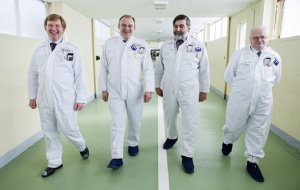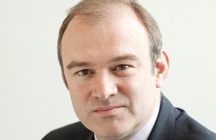Ed Davey

Ed Davey was the UK Liberal Democrats MP for Kingston and Surbiton from 1997 to 2015. He was beaten by the Conservative Party's candidate James Berry in the UK general election. [1]
Davey was energy secretary from 2012 until 2015. Amber Rudd replaced him in this role.
Since leaving office in May 2015, Davey has set up an independent consultancy on energy and climate change and has taken up several roles with high-profile companies involved in the energy business.
Revolving door appointments
In September 2015 Davey accepted a commission with Herbert Smith Freehills, a leading London law firm with close links to energy firms such as Centrica, EDF Energy. In the same month, Davey also accepted a short consultancy as a policy adviser with Macquarie Bank, which aims to fund the installation of solar PV panels on the roofs of Council and housing association properties in the UK.
Davey's appointment as chairman of Mongoose Energy on a part-time paid basis was also announced in September 2015. Given the links between the company and Davey's former department, the Advisory Committee on Business Appointments advised that he take a six-month waiting period after leaving office before starting. [2]
Energy secretary 2012-2015
Davey was appointed UK secretary of state for energy and climate change in February 2012, following the resignation of Chris Huhne.[3] He was previously consumer affairs minister in the UK Department for Business, Innovation and Skills (BIS).
Nuclear power
Volte face on nuclear power as minister

|
This article is part of the Nuclear Spin project of Spinwatch. |
In 2006 while in opposition Davey had said, “Nuclear power will only be possible with vast taxpayer subsidies or a rigged market.”
Yet in May 2012, Davey presented a draft Energy Bill containing complex 'electricity market reform' provisions that were roundly criticised by leading commentators as heavily tilted in favour of nuclear power.
In an interview Davey conceded the market was rigged, but insisted it would not benefit only nuclear. "It’s going to help all low-carbon technologies," he said. [4]
In September 2013 Davey persuaded Lib Dem party members to vote to accept nuclear power for the first time, arguing that it would "reckless" to rely on coal and gas, and insisting that there still would be no public subsidy for nuclear. He told the Lib Dem annual party conference that "I've changed my mind because of climate change", and that it would be "unimaginably" hard to create a zero-carbon Britain without getting electricity from nuclear. [5]
Hinkley Point: 'We've got a great deal [with EDF]'
In October 2013, after more than 18 months of negotiations, Davey announced that the Government was 'extremely close' to finalising terms with EDF Energy for the £14bn programme to build twin nuclear plants at Hinkley Point, Somerset. Despite serious public concerns that EDF had potentially secured a 'strike-price' deal 50pc above the current wholesale cost of power Davey told the BBC’s Andrew Marr Show: 'I’m convinced I’ll be able to look consumers in the eye and say we’ve got a great deal.' [6]
Potential conflict of interest
Davey’s older brother, Henry Davey, is a corporate partner and energy expert at Herbert Smith, a leading London law firm with a longstanding relationship with nuclear giant EDF Energy and close links to energy companies such as Centrica and BP. The firm is a member of the Nuclear Industry Association lobby group.[7] Its website declares it is ‘proud to be at the vanguard of next generation nuclear in the UK’.
Henry Davey has been reportedly involved in briefing reports on Feed-in Tariff cuts for solar power and UK electricity market reforms. According to the Telegraph, in 2005 he offered the following diagnosis on the UK’s energy prospects: “The Government urgently needs to address its energy policy as there are potentially serious security of supply issues on the horizon,” he said. “Getting the right commercial incentives for the market to respond to the future challenges, coupled with a clear steer of where nuclear will sit within the long-term energy mix, is essential.” [8]
A DECC statement said: “In accordance with the requirements of the Ministerial Code, the Secretary of State has provided his Permanent Secretary with a full list of his interests, including details of his brother’s employment as a partner at Herbert Smith LLP, which will be recorded and published in the List of Ministers’ Interests in the usual way. Appropriate safeguards are being put in place to avoid any conflicts of interest.” [9]
Persuades Lib Dem members to drop long-held opposition to nuclear power
In an historic reversal of policy, the Liberal Democrats voted to accept 'limited' nuclear power after Ed Davey told members at the September 2013 annual party conference that it would be 'reckless' to rely on coal and gas.
- He said: "When I have listened to pro-nuclear Liberal Democrats over the years, there is one argument I have found increasingly difficult to answer and that is the climate change argument.
- Climate change poses a real and massive danger to our planet. Not keeping a genuinely low source of electricity as an option is reckless when we don't know the future. We are going to need vast amounts of low carbon electricity to tackle climate change. Why? Because if our carbon capture and storage plans don't work, we may have to replace all fossil fuels for electricity generation, that is about 60% of all generation.
- If we do that without nuclear, you will need to replace about 85% of electricity generation. That's huge. [10]
Fracking

|
This article is part of the Spinwatch Fracking Portal and project |
In September 2013 Ed Davey shot down UK Prime Minister David Cameron's claim made the previous month that UK 'fracking has real potential to drive energy bills down'. Pointing out that Britain was only one part of a wider European gas market, Davey said that,
- North Sea gas didn’t significantly move UK prices – so we can’t expect UK shale production alone to have any effect.
He added that it was, 'far from clear that UK shale gas production could ever replicate the price effects seen in the US", where the shale gas boom has seen prices plummet'.
Davey's statement was in direct contrast to David Cameron, who had written in an article for the Telegraph newspaper:
- Just look at the United States: they’ve got more than 10,000 fracking wells opening up each year and their gas prices are three-and-a-half times lower than here. Even if we only see a fraction of the impact shale gas has had in America, we can expect to see lower energy prices in this country.[11]
Special advisers
- Paul Hodgson - February 2013-2015
- Chris Nicholson - March 2012-2015
Resources
- See Powerbase infographics: Fracking lobbying firms and Fracking Spads
- Melissa Jones and Andy Rowell, Access all areas: Westminster's (vast) fracking lobby exposed, 29 April 2015.
- George Monbiot, The energy bill is misleading, manipulative and destructive, guardian.co.uk, Thursday 31 May 2012 12.02 BST guardian.co.uk
- Geoffrey Lean, Energy Secretary Ed Davey: charged with keeping the lights on, The Telegraph, 25 May 2012
- Pete Roche, The Liberal Democrats' nuclear tax bombshell, Spinwatch, 20 February 2013
- Pete Roche, Ed Davey's nuclear Newspeak,Spinwatch 16 September 2013
Notes
- ↑ ref needed
- ↑ Summary of Business Appointments Applications - Rt Hon Edward Davey Gov.UK,15 September 2015, accessed 22 September 2015.
- ↑ New Ministerial Appointments, number10.gov.uk, 3 February 2012.
- ↑ Geoffrey Lean, Energy Secretary Ed Davey: charged with keeping the lights on, 25 May 2012, accessed 6 June 2012
- ↑ Rowena Mason, Lib Dems vote to accept nuclear power theguardian.com, 15 September 2013, acc 16 Sept 2013
- ↑ Roland Gribben, Deal on new nuclear near, says Davey The Telegraph, 13 Oct 2013 10:00PM BST, acc same day
- ↑ Nuclear Industry Association Our members, accessed 5 September 2012.
- ↑ Emily Gosden Are the lights about to go out all over Britain?, The Telegraph, 31 Mar 2012, acc
- ↑ Ed Davey declares brother's close links with Centrica, BP and EDF, Mon 06 Feb 2012
- ↑ Jason Beatie, Lib Dems conference: Party votes to drop its opposition to nuclear power, The Mirror, 15 Sep 2013 18:51, acc 16 Sept 2013
- ↑ Emily GosdenFracking won't lower energy bills, says Davey, 09 Sep 2013 1:42PM BST, acc 10 Sept 2013
